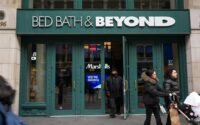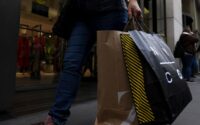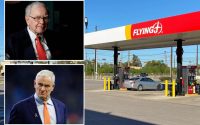NY cannabis launch turning into bad trip: social justice critics
The launch of New York’s legal cannabis industry is turning into a bad trip — even before the first official marijuana stores have opened for business, social justice critics claim.
A group advocating for the first licensed marijuana storefront sellers with prior weed convictions said Friday they’re being set up for failure.
The Cannabis Social Equity Coalition said the first sellers will be required to buy cannabis products from NY hemp farmers of “questionable quality and safety,” are not being adequately trained for the market and will face a mountain of debt.
Under New York’s “seed to sale” cannabis law, the product sold by licensed dispensaries must come from marijuana plants grown by local farmers.
But the group said the “biomass” type of cannabis grown by farmers is not a suitable flower for smoking.
“This type of cannabis is considered low grade, best suited for processing into oils, vapes, topicals and edible cannabis products. It is not suitable as a smokable flower for sale at dispensaries,” Reginald Fluellen of the Cannabis Social Equity Coalition said.
He also claimed cannabis grown by these Hemp farmers contains a “high amount of bacteria, yeast and mold.”

The state Office of Cannabis Management disputed the claim that it has authorized the growth and sale of bad weed.
“Let’s stick to the facts, and they’re clear: New York’s first adult-use dispensaries will be selling products grown by New York family farmers that have been tested for a wide array of potentially harmful elements, including heavy metals, e-coli, aspergillus, and other contaminants in line with practices in other states,” said Damian Fagon, OCM’s chief equity officer.
Meanwhile the Cannabis Social Equity Coalition claimed dispensary owners have not been given the adequate training and incubation support needed to run a highly regulated cannabis business and will be strapped with “high debt and high interest rates on debt repayment, on day one.”

OCM disputed these claims as buzz kill.
“These dispensary owners will receive support from the Social Equity Cannabis Investment Fund, breaking down barriers to capital in the complex industry; and they’re able to jumpstart the legal market with delivery sales, growing their capital before they open a storefront,” said OCM’s Fagon said.
He said the first dispensary owners already had a history of running other successful businesses and “jumping to conclusions about the products they will sell and their ability to be successful will only be damaging to them and our effort to establish the most equitable cannabis market in the nation.”
He also took a shot at the Cannabis Social Equity Coalition as MIA during the public comment process regarding the cannabis regulations.
“We look forward to their input on the regulations for most of the remaining market that were advanced by the Cannabis Control Board last month since we didn’t receive comment from them on the regulations for this dispensary program,” said Fagon.

Still, there’s little doubt that the budding cannabis program is facing challenges.
The latest criticism comes a day after revelations surfaced that former NBA star Chris Webber, selected by the state to help raise $200 million in a public-private partnership for the emerging legal weed industry, has failed to raise any cash.
Two days ago, a study revealed that there are “likely tens of thousands of illicit cannabis businesses” currently operating out of bodegas, smoke shops and other storefronts in New York City — with many of the pop-up shops selling bad or dangerously tainted weed.
Many of these black market weed sellers are paying little or no tax while the 36 state retail operators awarded licenses by the state last month will have to pay a steep cannabis tax.
That will make it difficult for the legal operators to compete on price with illicit sellers that have sprouted all over the city — including tidy, middle class neighborhoods such as Kew Gardens.


